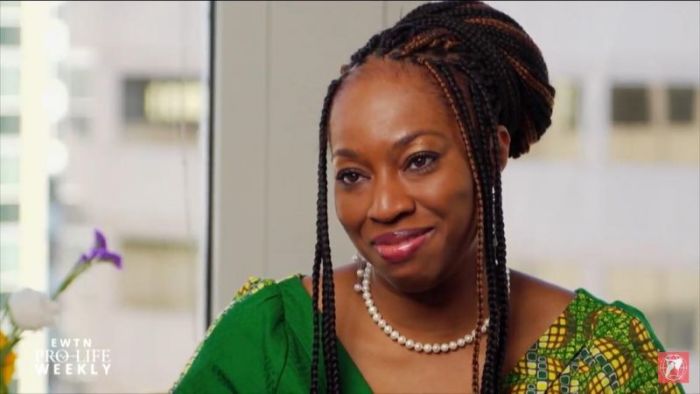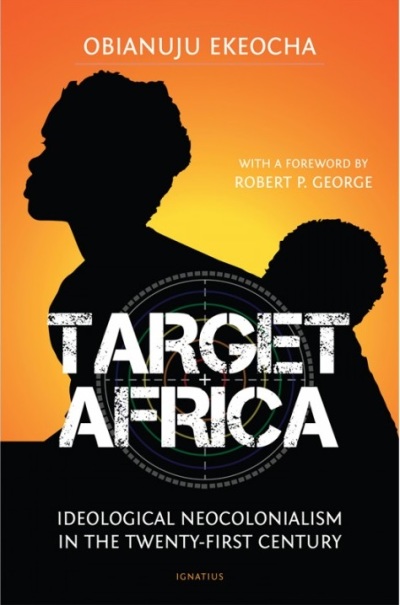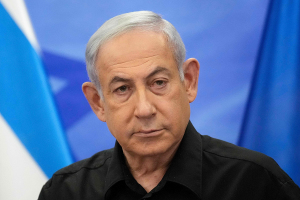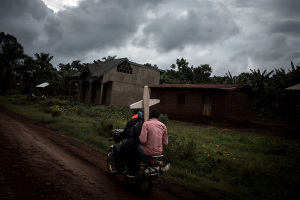The West Is Colonizing Africa With Abortion and Population Control, Obianuju Ekeocha Says

Africa is being recolonized today, though this time not with armies or arbitrary borders but through Western governments and humanitarian outfits imposing population control ideology, sexual liberation, and abortion, says Obianuju Ekeocha.
This new form of colonization is rooted in a master-slave mindset, Ekeocha stresses in her book, Target Africa: Ideological Neo-colonialism in the Twenty-First Century, which was released earlier this year and documents the nefarious funding streams and political schemes behind this injustice.
While Africa has undoubtedly struggled ever since the end of colonization with all kinds of socio-economic issues and political dysfunction, rich donors from the West have exploited those problems and have assumed the role of savior and deliverer, offering "solutions" contrary to the values of most African people, she explains in the book.
A vivacious international pro-life advocate, Ekeocha, who is Nigerian by birth and is now based in the U.K., began her investigation into this subject back in 2012 when Melinda Gates emerged with a proposal to raise $5 billion to fund contraception in Africa. Ekeocha was outraged and wrote Gates a letter explaining that she, as a Nigerian Catholic, neither needed nor wanted what she was bringing. What the Africans need is a good health care systems, food programs for young children, and better education opportunities, she says.
"If you have dollars, if you hold the purse-strings, unfortunately you are in the more powerful one in this dynamics of this relationship," Ekeocha said an interview with The Christian Post.
Much of the thinking stems from an alarmist belief that African demographics portend disaster given climate change and a less stable food supply. Some believe that the answer to those looming threats is fewer people and, therefore, drastic measures should be taken to reduce the population, a view rooted in Paul Ehrlich's 1968 book The Population Bomb. Yet even though Ehrlich's apocalyptic predictions never materialized, his work continues to underpin much of the approach being carried out in poor nations around the world.

And the solutions these Western entities provide "rely heavily on a single-minded strategy that entails removing or drastically reducing the source of the population growth in Africa — female fertility," Ekeocha says in the chapter on population control.
"Thus, Western nations, organizations, and foundations wage war against the bodies of African women," she continues.
While she always understood that Western nations were giving more money for condoms and contraception, she didn't want to entertain conspiracy theories, and sifted through mounds of data and statistics in the United Nations' archives where the money is closely tracked.
Ekeocha explains that a key year in all of this is 1994 when at a conference in Cairo, Egypt, Western governments were told that if they give money to African nations it can qualify as aid even if it's for contraceptives. From 1993 to 2012 such aid increased by 1,930 percent.
"When I did all the math, tracked all the money and put it all in one place, the amount of money going into the world for population programs was about $600 million dollars per year to $12 billion per year," Ekeocha told CP.
Anyone who makes that percentage of increase in money they are giving you within such a space of time means business, she said, and they have an agenda.
Ekeocha also unpacks how, through complicated schemes, even small organizations like the U.K.-based Population Matters markets a sense of self-righteousness to donors, allowing them to feel virtuous by buying environmental credit of sorts for the electricity and energy they consume. For every child born in Africa they ask their donors to give a certain amount of money based on their CO2 emissions.

As she explains in Chapter 6 "Modern-Day Colonial Masters," Population Matters launched an online initiative in 2009 just days after a climate summit in Copenhagen, Denmark. The website was called PopOffsets which "enable[d] individuals and organizations to offset their carbon emissions by making online donations for contraception and sterilization in Kenya, Tanzania, Ethiopia, and other developing countries, even though the carbon emissions per capita in the United Kingdom is more than 135 times higher than that in Ethiopia."
Alistair Currie, head of communications for Population Matters, says the organization no longer runs PopOffsets, a "scheme [that] supported family planning programs across the world, including in the U.S. and other parts of the developed world."
"Go ahead, commandeer the world's resource and live self-indulgently, Population Matters seems to be suggesting, so long as you prevent a poor African from being born," she writes.
Ekeocha told CP: "That scared me, because if a movement like that inasmuch as it's a small group here, but they still run in millions of pounds and dollars from all their members. ... And if someone is saying, 'I'm trying to make the Earth greener' so for every plane ride I take, every car ride I take, or every cup of coffee I buy, my use of electricity, I will make up for that by donating money to this group who will go out to Africa and do vasectomies on men." If such efforts are multiplied it could devastate the whole continent, she said, and the approach is wholly ineffective and wrongheaded.
Currie also told CP in an email that Population Matters, which was started in 1991 under Optimum Population Trust, had an operating budget last year of around $413,000, and does not have millions of pounds in annual assets.
Ekeocha, who's a biomedical scientist with a specialization in hematology, founded Culture of Life Africa in 2013 to highlight the toxic connection between the abortion and family planning industries and foreign aid. Her profile has only continued to gain traction ever since; she's also active on Twitter where she frequently speaks out on pro-life issues and has amassed a following of nearly 43,000.
In 2016, when speaking before the United Nations in New York during a session on best practices for maternal health in Africa at the Commission on the Status of Women, a video showing a portion of her remarks went viral. A Danish representative was provoked that Ekeocha would refer to the humanitarian efforts promoting abortion as "colonization" and argued that the Africans ought to regard this as a positive development, and let Africans make their own choices.
Ekeocha replied that if she tried to translate into the Igbo language what it means for a woman to "choose what to do with her body" and that abortion is somehow a good thing, she could not do it as there is no way of even phrasing such an idea in her tribal tongue.
"Culturally, most of the African communities actually believe, by tradition, by their cultural standards, that abortion is a direct attack on human life," she said at the time.
"So for anybody to convince any woman in Africa that abortion is actually a good thing and can be a good thing, you first of all have to tell her that what her parents and what her grandparents and her ancestors taught her was actually wrong. You're going to have to tell her that they have always been wrong in their thinking, and that is colonization."
African countries have been put into a position where they're being forced to take aid money that is destructive and addictive, Ekeocha told CP. The final chapter of Target Africa outlines how she believes the continent needs to be decolonized from certain Western influences and the superiority complexes many groups carry when they come bearing "gifts."
"We're kind of at an impasse" Ekeocha said, noting that African nations are frequently told that they are "independent" countries, because while they are not under colonial rule as in ages past, they remain beholden to these outside Western donor groups.
She hopes her book will provide a diagnostic snapshot of the proverbial wounds and infection in this system. Ekeocha reiterated that the continent's many problems will not be solved by having fewer people, and Westerners, Christians included, have a lot to learn from African believers and its people.
In a region of the world known for some of the worst poverty on the planet, a poverty that touches many in African societies, she explains, Africans know in the core of their being that God is their only hope.
"When you don't have governments stepping in now and again, and all of the programs that we find here in Europe and America, entitlements and all those things, we don't have them. And, in a way, it's a good thing, because that means people get to understand who really is their Provider, their Protector and that their sustenance comes from God," she told CP.
Ekeocha thought that she would be accustomed to life in the West when she moved to the U.K., having read many Western novels and watched movies, but she was in for a surprise. She told CP that prior to relocated to Europe she had never met more than five atheists in her whole life.
"We don't have big atheist communities in Africa because people understand you cannot be in a place where you do not have any safety net and not recognize that God is your safety net. Even the wealthy Nigerians still have to cling to God. We cling to God because at any point in time your life, your protection, your sustenance — that even breathing comes from God Almighty."
"And Africans are not ashamed to hold on to that child-like faith. We are unashamedly dependent on Him."




























